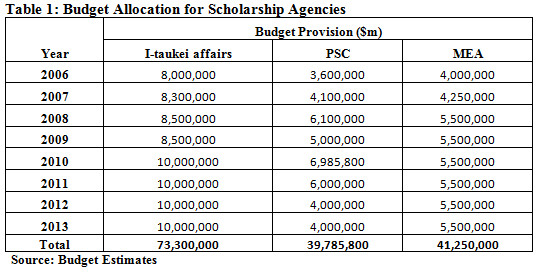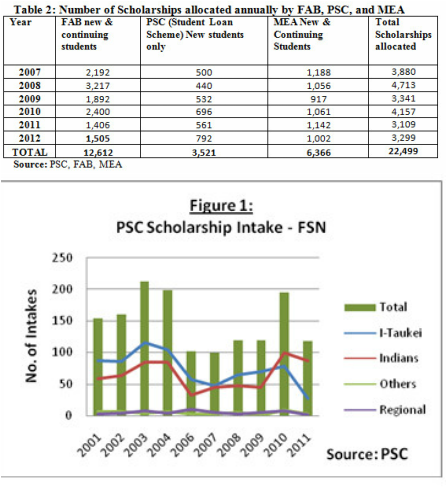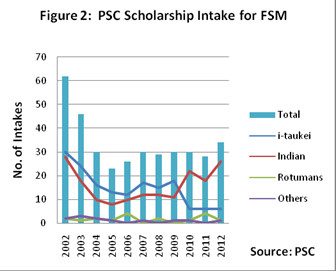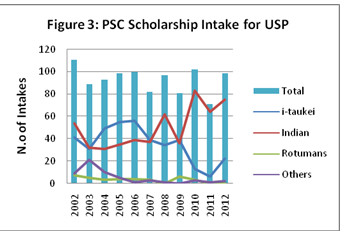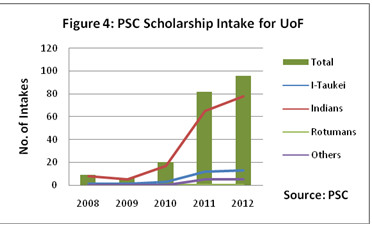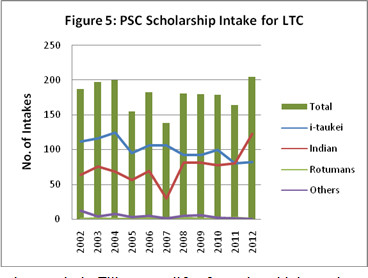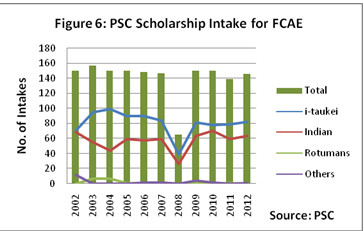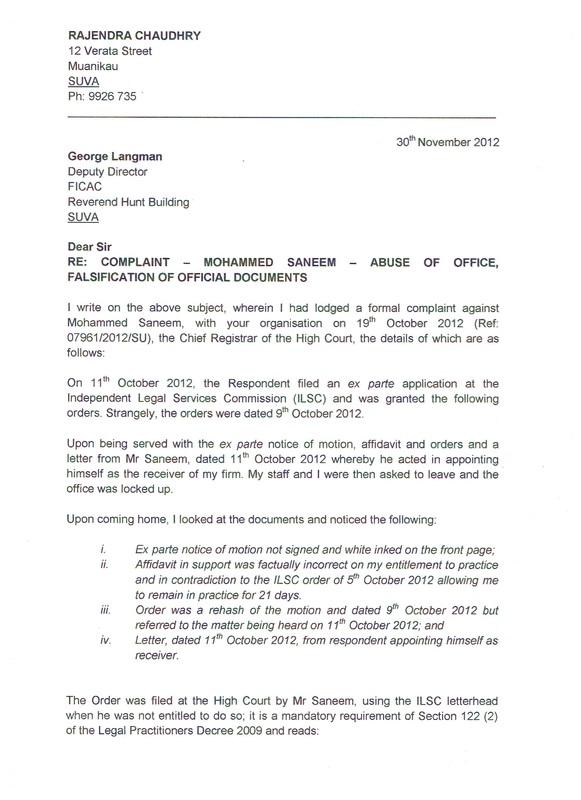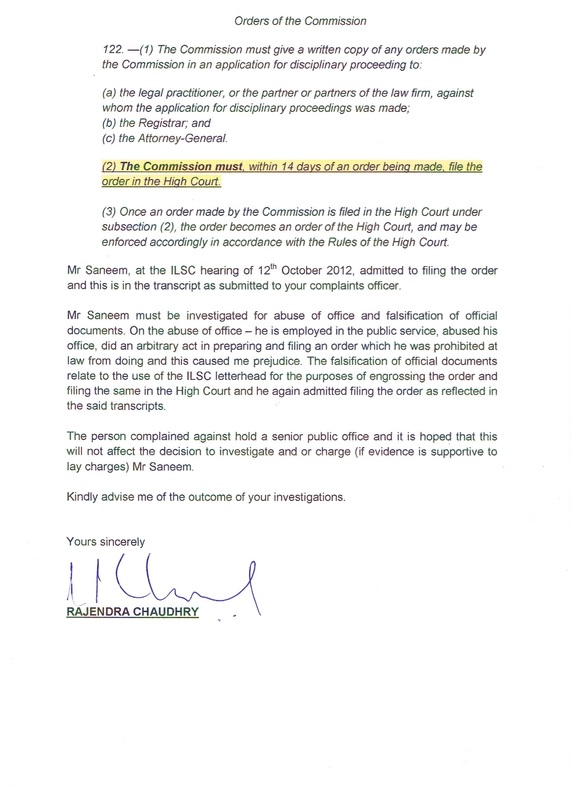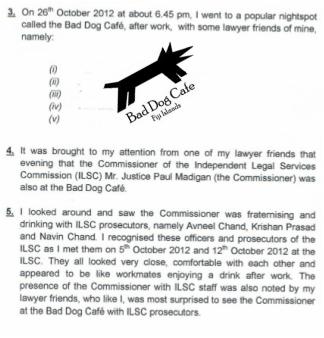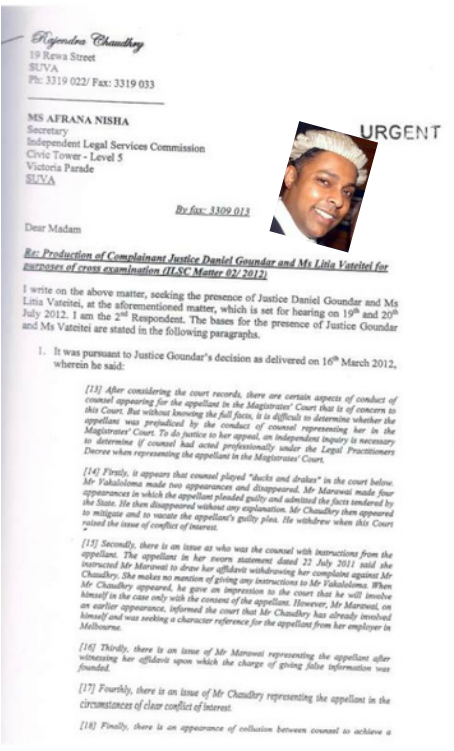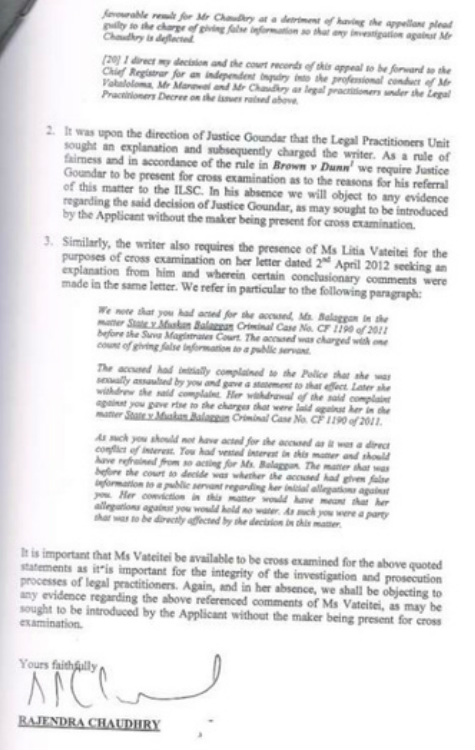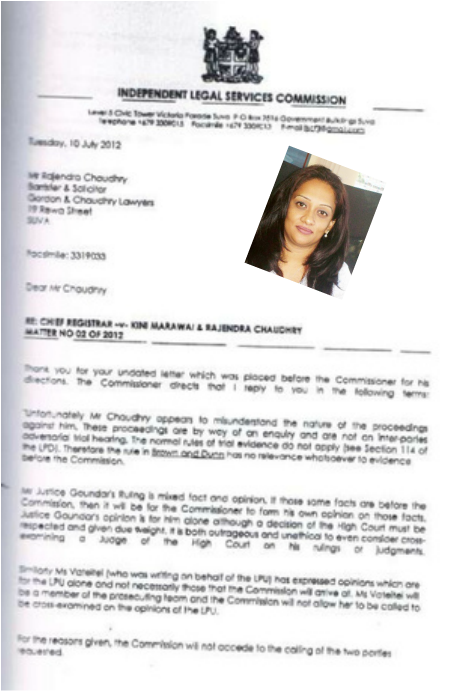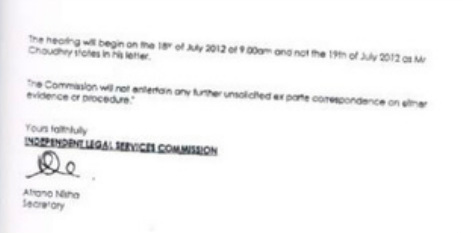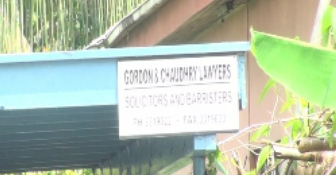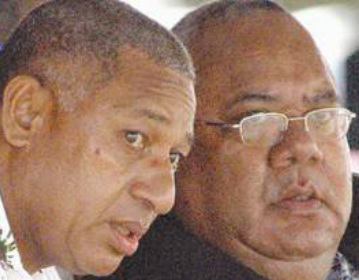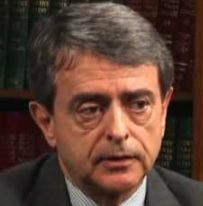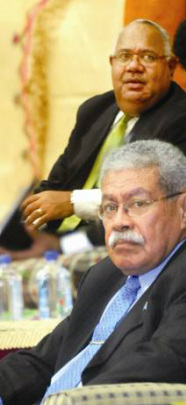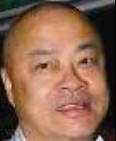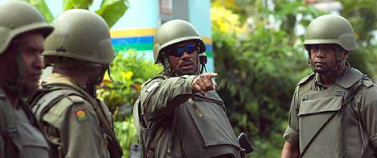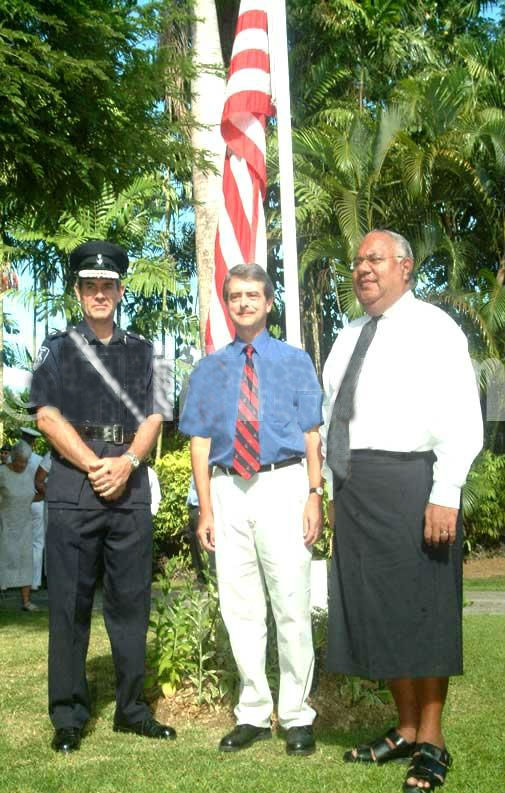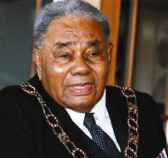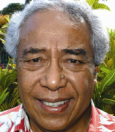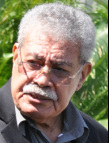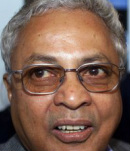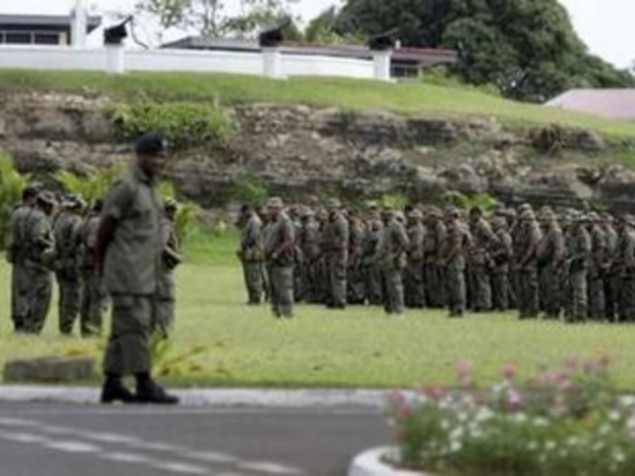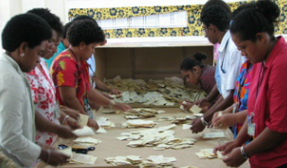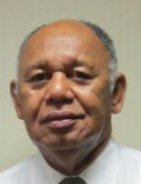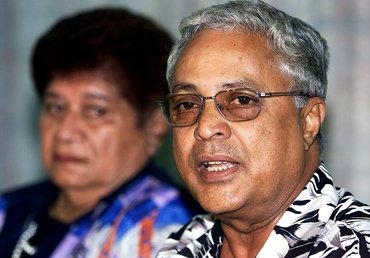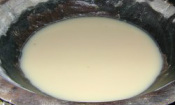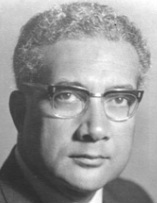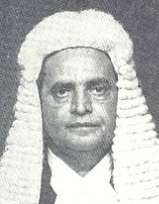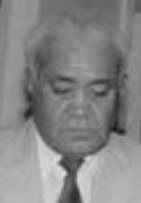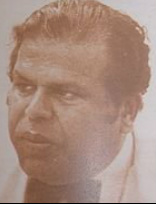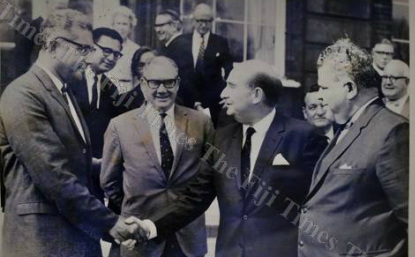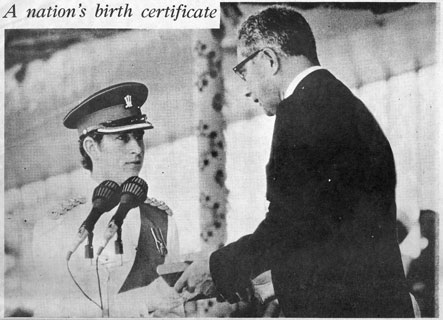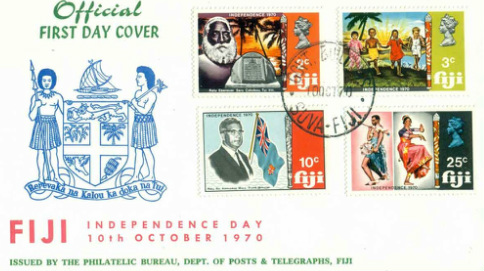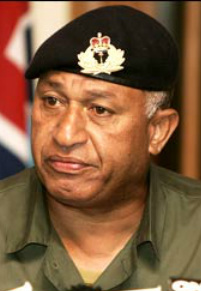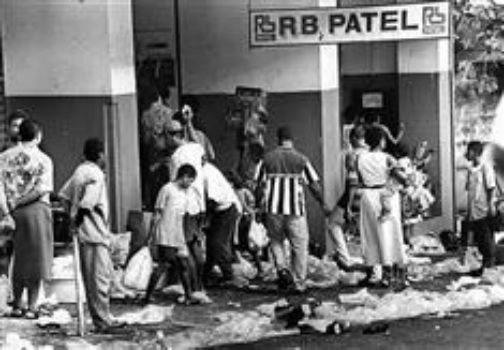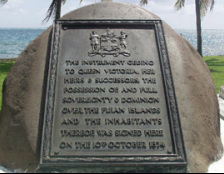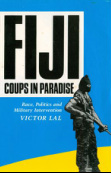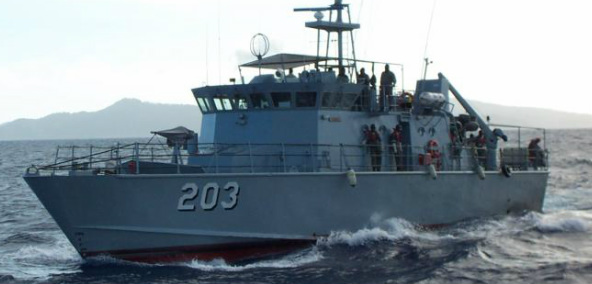EQUITY OVER DIVERSITY: The Impact of Merging Government Scholarship Programs on i-taukei Fijians
The scholarship gap before the merger were somewhat marginal. However it is now compounded, giving the upper edge to Indo-Fijian after introduction of merit-based system in 2010
|
Purpose
The purpose of this study is (i) to provide an analysis of the current status of local government scholarship; (ii) to examine the effect of PSC and MEA scholarship merger; (iii) to provide implications on the proposed review and overhauling of all government scholarship programme on Fiji’s future Human Resource Requirements; and (iv) Provide policy recommendation as the way forward. Background Ensuring education for all remains the priority of the present self-appointed government. This could be hampered by the recent draft Constitution of Fiji with an absence of Affirmative Action to ensure that education is received equally amongst all ethnic groups. The draft Constitution stipulates and encourages equality regardless of race, gender or religion. The impact of this is evident in the allocation of scholarships amongst the three major local government scholarship agencies namely the PSC, MEA and the I-Taukei Affairs scholarships. The context of this study discusses this impact. In 2010 the MEA Scholarship was merged with the PSC under the Merit Based System for selection. The purpose of the merger was to harmonize local scholarships under a single umbrella for cost cutting measures and eliminates duplication role and functions existing within the two agencies. Briefly, in terms of budgetary provisions, about $39.7 million has been directed for PSC scholarships from 2006 to 2012 with an average of $4.9 million annually. The MEA is about $5 million on average annually with the i-Taukei affairs of about $9.1 million on average. More details outlined in Table 1. Over the years there has been continuous increase in budget allocation for the three scholarship agencies which is attributed to the increasing demand and rising number of student’s applicant. The priority areas of training identified by the Ministry of Strategic Planning also contributes to the increase in the amount of funds allocated for scholarships annually to address the skills need of the country. Government Scholarships Allocation Table 2 provides the trend of awards allocated yearly from 2007-2012. From 2007 to 2012, on average there were about five hundred and eighty six (586) scholarships provided by PSC, one thousand and sixty one (1,061) by MEA and a total of two thousand one hundred and two (2,102) by the i-Taukei Affairs. Majority of scholarships allocated are provided by the Ministry of i-Taukei Affairs of about 56% annually compared to the PSC with 15.6% and MEA comprising of 28.3%. The increasing trend of students vying for i-Taukei scholarship is attributed to the entry policy of gaining 250 marks and above and this also addresses disadvantaged i-Taukei students who have marks as low as 250 who could not qualify for other scholarships. The Bonding Policy There exist three (3) different bond policies for government scholarships. The PSC bonding policy operates on dual schemes which include the Student Loan Scheme and the Cost Sharing Loan Scheme. The Student Loan Scheme is a full scholarship award where candidates pay back the full amount once the awardee secures paid employment whilst the Cost Sharing Loan scheme operates on one third and two third basis, that is 2/3 bonded by government and 1/3 bonded by the student. On the contrary, the i-Taukei affairs scholarship bond policy requires students to serve in the country after completion of studies without any repayment undertaken by the awardees similar to that of the MEA. Current Status of the Merger - PSC and MEA Scholarships Subsequent to the merger, the PSC and the MEA comprise of a single policy for Student Loan Scheme with criteria on Merit Based System. The current merit based system implemented in 2010 replaces the allocation of scholarships on ethnic basis distributed equally including the minorities (Rotumans, Rabi and Kioa). Figure 1-6 shows the current status of the merger (PSC AND MEA) through awards allocated to different major institutions. On a brief note, the graphical analysis provided below creates a large educational gap between the Indo Fijians and other ethnic groups. This gap is anticipated to widen if not addressed adequately. Nurses Intake at FSN Figure 1 shows the number of nursing intakes with PSC scholarships for the past ten (10) years by ethnic groups. Enrolments at FSN show an interesting trend when taking into consideration data by ethnic groups. Based on the ethnic allocation of scholarships, the i-taukei dominated the PSC sponsored students at FSN from 2001 – 2009 as shown in Figure 1. A point to note is that the scholarship gap before the merger were somewhat marginal, however it was compounded giving the upper edge for Indo-Fijian when the merit-based system was introduced in 2010. However, with the introduction of the merit based system in 2010, the Indo-Fijians for the first time in 10 years dominated the PSC sponsored intake in FSN and the gap further widened in 2011. In 2010 the number of Indo Fijians intake increases by 122.2 percent which is 51.3 percent of the total enrolment; with intakes for i-taukei increasing by 14.5 percent which is 40.5 percent of the total enrolment. Similarly, in 2011 the number of Indo Fijians intake is 72.3 percent of the total enrolment with 20.1 percent for i-taukei and 6.7 percent for others. MBBS Intakes at FSM The intakes for MBBS at FSM shows a huge difference in 2010 and further widened from 2011-2012 compared to previous years. There was a decline of 66 percent for i-taukei intakes and an increase of 100 percent for indo-Fijians and a constant growth for others. From 2011 to 2012, while the scholarships amongst other ethnic groups were somewhat marginal, the gaps between the Indo-Fijians were largely compounded. USP Intake Figure 3 shows the number of intakes by ethnic groups at USP who were on PSC scholarship from 2002 to 2012. Of the total number of students applying for USP scholarships in 2010, approximately 81.4 percent are indo-Fijians, 12.6 percent are i-taukei and 3.0 percent for the Rotumans and Others. The gap further widens from 2011 to 2012. When compared to previous years from 2002 to 2009, the number of intakes hovers around the ratio of 50:50 and 60:40 percent amongst all ethnic groups. University of Fiji Intake It is imperative to note that the newly established University of Fiji (UoF) has been initially offered scholarship from 2008. Figure 4 shows the number of PSC sponsored students by ethnic groups for UoF. The total number of intakes in 2010 shows an increase of 233.3 percent compared to 2009. About 85.0 percent are indo-Fijians and 15.0 percent consist of i-taukei. Similar trends persist with a wide gap from 2011-2012. Teachers College Intake With direct comparison; the teachers college for both LTC (Figure 5) and FCAE (Figure 6) shows a continuous balance of intakes amongst ethnic groups from 2002 to 2010 compared to intakes for other tertiary institutions. The more intakes for i–taukei are attributed to the merit based system for which they qualify, whereas Indo-Fijians qualify for other high tertiary institutions. Thus, competition for other higher tertiary institutions leaves i-taukei and other ethnic groups streaming to the teachers college. From 2011-2012 this trend has been dominated by the Indo-Fijians. Figure 6 presents the trend of intakes rather similar to the LTC intakes amongst ethnic groups which hover around on a balance intake but dominated by the i-taukei. In 2010 about 52.0 percent are i-taukei, 46.6 percent are Indo Fijians and 1.3 percent consists of Others. This marginal trend continues for the subsequent years. |
Effects of the Merger
The recent merger between PSC and the MEA has somewhat created a substantial educational gap and divide amongst ethnic groups. Given that the I-Taukei Affairs scholarships has been proposed to merged with the two scholarship unit; there is a threat that the I-Taukei and other minorities will have no place for competitions for scholarship awards. Such merger defeats the purpose of Pillar 9 of the Peoples Charter in Making Fiji a Knowledge Based Society by ensuring access to quality education for all. Further impact will be felt by those living below the basic needs poverty line which is 31% with majority who resides in rural areas (18%) that comprises of the I-Taukei. |
Comparison with Other International Countries
|
Comparison analysis on allocation of scholarships with other international countries shows the significance of maintaining certain allocations for the indigenous in terms of education as the only conduit for development.
In Malaysia, the Public Service Departments Scholarship of Malaysia allocates around 1,500 scholarships annually. About 300 scholarships are targeted for merit based only whilst the others are distributed amongst the following Native Groups of Malaysia:300 Awards – Merit; 720 Awards – Malays;60 Awards – Sabah Bumiputeras;60 Awards – Sarawak Bumiputeras; and120 Awards – Socially Handicapped. Similarly in New Zealand, the Maoris have separate scholarships to pursue higher education level. Such scholarships comprises of the Wakatu Scholarship, Whanui Scholarships, Rona Scholarships to name a few. Each scholarship programmes target different higher education level from Certificate to Masters Programme. Furthermore, to address the education between the Aborigines and the Australians, the Government of Australia from 2009-2012 allocates around $20m annually as a scholarship grant (Australian Indigenous Education Foundation Scholarship Programme) targeted for the Aborigines alone. Significantly our first world trade partner, the US also recognizes the importance of allocating certain scholarship programmes for the Natives of America. The American Indian College Fund Scholarship are dedicated to the American Indians who pursues higher education as a means to address the education gap amongst other ethnic groups Implications of overhauling government scholarships on Fiji’s Human Resource Requirements While there is universal recognition for the merit-based system and equality, special consideration should be noted for selective intellectual capacity based on ethnicity. Fiji’s homogenous society is not sophisticated enough to warrant this policy intervention as compared to advanced economies the world over. There will still be socio-economic considerations to grapple with given our level of development. In view of the education gap and divide amongst ethnic group as a result of the merger under a merit based system, it is significant to note the impact this has on Fiji’s future human resource requirement. Merit Based System and Migration Trend Evidence suggests that most recipients of Government sanctioned scholarship programmes tend to migrate after serving their respective bonds. This has been an on-going trend since 1987 and has somewhat tilted the consistency of manpower planning in the past two decades. Consequently, the merit based system will aggravate the increasing migration trend dominated by Indo Fijians. Ulitmately, this will result in continuous shortage and imbalance in the labour market in terms of addressing the Human Resource needs of the nation in priority sectors of the economy. This defeats the policy intent and points to the fact surrounding the reality behind the merit-based system of awarding scholarships. Appendix 1 shows the number of employed personnel migrating annually from 2006 to 2010. It is imperative to note that a total of 5,201 employed skilled personnel have migrated in 2006 which consist of about 83% of Indo Fijians, 12% are i-Taukei and 5% consist of Other races. Similar trends of migration transpired in 2007 with 81.3% of Indo Fijians, 13% of i-Taukei and 5.7% comprise of other races. The 2006 and 2007 migration trend shows that on average, a total of fifty seven (57) i-Taukei migrated annually from each of the occupational groups compared to three hundred and seventy one (371) indo-Fijians on average in the same period with other races comprise of twenty seven (27) personnel migrating from each of the occupational group. This illustrates the point that overhauling of scholarships and providing a single merit based system across the board without harmonizing and taking into considerations all ethnic groups will not address the future needs of our human resource needs. |
Outlook Imbalance in the Labour Market
Overhauling of government scholarships and adopting a single policy of Student Loan Scheme on merit based system creates an imbalance in the labour market. Whilst addressing the priority areas for human resource requirements which will be faced with continuous shortage as a result of migration, other professions will be faced with oversupply of labour as majority who cannot compete at the highest level of merit based system would target the same profession such as teaching (FCAE & LTC) and other trades profession. The outcome of the imbalance would further generate and increase governments need and spending on recruiting expatriates to meet the vacuum created by those large numbers migrating. Policy Recommendation Merger of Government Scholarships In view of the above analysis, there is a great need to maintain the I-Taukei Affairs Scholarship – not for discriminatory aspects but towards addressing future substantial educational gap amongst ethnic groups. Addressing future impact of human resource requirements The Ministry of Strategic Planning National Development and Statistics agrees with the merger and the merit based system, however, to meet Fiji’s future human resource requirement there is need to have special provision in the new scheme too address the needs of the i-taukei and the minorities, given that migration amongst the indo-Fijians is high. A quota or ceiling scheme could be considered to address such need. Having such a racial balance is aligned to government’s objective in Pillar 2 of the PCCPP in promoting multi cultural education. Addressing Priority Areas of Training While overhauling of local government scholarship eradicates the duplication of work, cuts costs, maximizes return to investment in education, and leads to better utilisation of government’s resources under a single umbrella, the priority areas of human resource needs identified by the Ministry of Strategic Planning needs to be adequately addressed for training to meet the labour market requirement. Addressing Poverty Alleviation To address poverty alleviation, flexibility of entry marks to be allocated to the disadvantage students as most will be left out given the merit based system despite their disadvantage educational upbringing compared to those who have all access to educational facilities. Addressing the Impact of Migration Practically, the future impact of migration trend dominated by a single ethnic group portrays the need to harmonise scholarship allocation under a balance merit based system for all ethnic groups to address the impact of migration. Migration of a single ethnic group affecting occupational group will be easily addressed and replaced if scholarships are disseminated amongst others who have minimal migration trend. A tracer study is also recommended to be undertaken. Consultation Further consultation to be undertaken with the three local government scholarship agencies to map-out a more comprehensive harmonizing strategy to effectively address the current and future human resource needs of the nation. Conclusion Education for all and promoting multi cultural education for equal development opportunities remains the major priority for government as it alleviates poverty and making Fiji a knowledge based society. The proposed overhauling and review of local government scholarships addresses duplication of work and cost cutting measures for better utilisation of government’s resources. The merger of all three government scholarships should effectively address the priority areas of human resource needs of the nation which should take on board the impact of migration trend, and the need to minimize the imbalance in the labour market. |
POWERS AND PARDONS IN FIJI COUPS: The Muanikau Accord and Surrender of Weapons
"In fact the Accord contained no such condition. The only reference to weapons was in a recital of the Objectives of the Interim Military Government. There was never any express undertaking made on behalf of the Speight group to return weapons."
|
By PETER RIDWAY
Your browser does not support viewing this document. Click here to download the document.
|
FICAC keeps Chaudhry waiting over Chief Registrar complaint for office abuse and falsification of documents
Rajendra Chaudhry's legal dogfight for justice:
Judge Paul Madigan told to recuse for drinking at Bad Dog Cafe
with ILSC prosecutors & investigators handling case
|
Rajenddra Chaudhry's NOTICE OF MOTION (RECUSAL) I, RAJENDRA PAL CHAUDHRY, of Verata Street, Suva legal practitioner, hereby make oath and say as follows:
1. I am the Applicant in this matter. 2. I make this affidavit from matters personally known to me unless i say so otherwise and i believe the same to be true. 3. On or around 22nd May 2012, i was charged with one count of unsatisfactory professional conduct and one count of professional misconduct. 4. The hearing date for my matter was set for 18th July 2012. The Respondent filed a Notice of Hearing and List of Documents relied upon for the hearing on 23rd May 2012. 5. On or around 2nd July 2012, i wrote a letter to the Secretary of the ILSC, Ms Afrana Nisha, requesting that the Commission do make available for cross examination the complainants, being Goundar J and or the Chief Registrar’s staff Litia Veteitei. I annex hereto and mark as RC1, a copy of the said letter to the Secretary of the ILSC. 6. On or around 10th July 2012, I received a response from the Secretary ILSC, wherein my request for the complainant/s to be present for the hearing was refused. I annex hereto and mark RC2, a copy of the said letter from the Secretary ILSC dated 10th July 2012. 7. My hearing was on 18th and 31st July 2012 and the Respondent called only one witness – the prison officer. No other witness were called. 8. On 5th October 2012, I was suspended from practice for 5 years till 1st March 2017. This sentence was pursuant to a judgment dated 12th September 2012. 9. I appealed the judgment and sentence on or around 8th October 2012. 10. I filed my stay pending appeal on or around 9th October 2012. 11. On or around 11th October 2012, the Commission made ex parte orders closing my practice and Mohammed Saneem appointed himself receiver. 12. My stay application was called on 19th and 26th October 2012. 13. During the hearing of the ex parte matter on 12th October 2012, the Commissioner said that the closure of office arouse from a television interview which he had seen. He also said it was irrelevant whether the Respondent was an agent of the ILSC. During the same proceedings, the Commissioner also said that it was his work to regulate the legal profession within the Legal Practitioners Unit. I annex hereto and mark as RC3, a copy of the transcripts of the hearing of 12th October 2012. 14. On 12th October 2012, the Respondent appointed Shalend Krishna receiver. 15. The proceedings on stay was very one sided and the Commissioner appeared determined to interject at every given opportunity and kept delaying proceedings by assigning only one and a half to two hours on the stay hearing/s. On 19th October 2012, the Commissioner gave the Respondent seven days to respond to my submissions after they had already filed submissions on 12th October 2012. 16. On the 12th October 2012, the Commissioner allowed Greg Bullard – a magistrate and Mohammed Saneem – the receiver of my practice at that time to appear before the Commission despite my clear objections. 17. On or around 15th October 2012, the Commissioner by way of a letter issued by the Secretary ILSC said all future proceedings as it related to me would be closed to public and the only persons who would be present would be the ILSC prosecutors and i. 18. On 26th October 2012, the Commissioner was again constantly interjecting to the point where i8 informed him that i would leave if the practice continued. 19. In acting as he did, the Commissioner was clearly showing his demonstrable bias in favour of the Respondent. 20. The Respondent also has offices in the ILSC and such offices are fully maintained for all of the Respondent’s officers who investigate and or prosecute legal practitioners. 21. The Commissioner also has daily interaction with the Respondent on account of his office as a judge of the High Court. 22. On 26th October 2012 at about 7 pm, the Commissioner was seen at a popular nightspot called the Bad Dog Cafe, where he was seen drinking with ILSC prosecutions and staff, namely Avneel Chand, Krishan Prasad and Navin Chand and few other persons all of whom are under the employ of the Respondent. 23. The presence of the Commissioner with ILSC staff was noted by several lawyers who were surprised to see him there with ILSC prosecutors. He was there for an hour at least and was seen drinking and socialising with the ILSC investigators and or prosecutors. 24. Some of the lawyers who witnessed this interaction of the Commissioner with ILSC prosecutors have given an affidavit to verify their version of what they saw. I annex hereto and mark as RC4 a copy of one such affidavit. In addition there were numerous other persons who saw the fraternising by the Commissioner of the ILSC investigators and or prosecutors 25. The Commissioner has always been a prosecutor both in Hong Kong and in Fiji with the Fiji Independent Commission against Corruption and has not appeared to have shed his prosecutorial skin and his most recent act of openly associating with ILSC investigators and prosecutors in a pub this undermines the risk of a fair trial as has been the case with me. 26. Such close and personal interaction between an ‘Independent Commissioner’ and the ILSC prosecutors would clearly suggest to an informed and reasonable person that the Commissioner would not be fair to the defence. Drinking with ILSC prosecutors in a pub in full view of public clearly would suggest to a reasonable and informed person that the Commissioner was very friendly with the ILSC prosecutors and would therefore not act objectively and this is evident in his judgment and sentence. 27. By doing what he did, the Commissioner has also breached the code of judicial conduct as contained in the Bangalore Declaration and which was adopted by the Fiji judiciary on or around 2005 and this would suggest to a reasonable and informed observer that the Commissioner was biased. 28. It was for the reason/s of his bias that the Commissioner: - Made findings which clearly not available to him to make from the said disciplinary hearings; Pronounced sentence which was harsh, unjust and unreasonable; and, Ordered the closure of my office from what he watched on television and which was not part of the depositions in the ex parte application. 29. It is important for the Commissioner to rescue himself to preserve the integrity of the proceedings. 30. Another judge should be appointed to hear my stay application and this should be heard quickly as my right to practice is at stake. The Commissioner had said that my stay ruling would be on notice and this is most unusual for urgent applications of such a nature where the stay in the Court of Appeal is predicated upon a stay ruling in the ILSC and the longer the delay in the ruling on stay, the longer the time for appeal in the Fiji Court of Appeal and the greater the prejudice to me. 31. I make this urgent application as my stay application is still pending at the ILSC and to be decided by the Commissioner Mr Justice Paul Madigan especially as he has been seen after office hours with the officers of the Chief Registrar’s office, fraternising and drinking with them, and to a reasonable and informed observer he would appear to be biased. 32. I also seek orders against the Respondent in not interfering with right to practice if a stay is granted against the judgment and sentence of the Commission dated 12th September 2012 and 5th October 2012 respectively. 33. The Office closure is a separate issue as if I am granted a stay of the judgment of 5th October 2012, i can practice and earn money to support myself and my family and pay the mortgage. |
Bainimarama-Madraiwiwi-Leung nexus: Troika met in secret around grog bowl as Fiji waited for coup
|
"From VP Madraiwiwi's private comments last weekend, it sounds as if Government House has decided to duck, a breathtaking abdication of responsibility." |
|
4: Chaudhry and RFMF accused of scuppering new President hopeful
In his cable to Washington, Dinger wrote: “A few days ago, Fiji President Iloilo announced that he is prepared to take a second term, to begin in March. This was rather a surprise, since rumor had it that the 85-year-old, who is in poor physical health, aspired to retire to his village. Acting President Madraiwiwi has informed us that Iloilo does not expect to serve another entire 5-year term, but he thinks he can add stability during a troubled time for Fiji, including for the coming elections. Bainimarama, who has had President Iloilo's support at crucial times, is very pleased by the news. CEO Kotobalavu gave us a clear impression the PM [Laisenia Qarase] is much less enthusiastic. Kotobalavu blamed the RFMF and [Mahendra] Chaudhry for encouraging Iloilo to stay on, a decision which "is not really good for the country." Fiji's President is selected by the Great Council of Chiefs, and some have speculated PM Qarase was angling behind the scenes for a "conservative," maybe current Fiji High Commissioner to Malaysia Adi Samanumu Cakobau. Adi Samanunu is anathema to Bainimarama, who is convinced she was a major instigator of the 2000 coup. Interestingly, Kotobalavu told us that if Iloilo receives a second term (and under Fijian chiefly custom it would be very rude for the GCC to deny him that request once made), Vice President Madraiwiwi would automatically serve out the term as President if Iloilo were to resign. |
5: Bainimarama wanted 2006 election postponed until census
In the same cable Dinger disclosed that Bainimarama wanted the 2006 election postponed for he feared that Qarase might irredeemably rig it. He told Washington: “Fiji's general election may take place as early as late April. Political parties are gearing up. Opposition leader Chaudhry seems satisfied that complaints about electoral-registration are being resolved. Elections Commissioner Leung is confident a free and fair election can take place. However, Republic of Fiji Military Forces (RFMF) Commander Bainimarama is convinced the coming elections are already irretrievably rigged. He told us he intends to ensure the elections are postponed, preferably by Fiji's civilian leadership. We comment that both Bainimarama and the opposition Labor Party seem to take a relativistic view of “rule of law” when it comes to removing the current Qarase Government. If elections are imminent, Bainimarama will have to decide rapidly how to proceed. He knows full well the negative consequences of ordering an illegal act, including on relations with the U.S. Bainimarama wants a legal way out and will push for a civilian solution. If that doesn't happen to his satisfaction, tensions such as flamed in January may well recur.” 6: Bainimarama wanted new Interim Government before election While key political players were looking forward to the 2006 election, Bainimarama was convinced, however, that the election had already been rigged by Qarase and his SDL Party. Bainimarama told Dinger, as relayed by Dinger to Washington: “RFMF Commander Bainimarama is convinced, however, that the coming election has already been irredeemably rigged by PM Qarase and his SDL Party. As evidence, Bainimarama noted to us that Fiji's last census was in 1996, and the mandatory, ten-yearly one for 2006 has been delayed. Leung (then Election Commissioner) told us the delay is because "the system" was not adequately prepared to conduct a census in time for the coming 2006 election. Bainimarama, on the other hand, reported that his brother, who runs the statistics office, has been ready and willing to proceed on the census (which would take at least 6 months) but has been stymied. Bainimarama believes that, absent a proper census, there is no way electoral boundaries can be properly set and it is impossible to judge whether all eligible voters have been registered. Leung, who is admired by both Government and opposition leaders for his integrity and who is a close friend of Acting President Madraiwiwi, believes a fair election can be run despite the lack of current census figures. When we noted to Bainimarama that Fiji law requires an election to take place before November, making a census at this point almost impossible, he responded that something will have to be done. He made clear his view that Fiji cannot weather an election which wrongly places the current Qarase Government in office for another 5 years. When we reiterated USG views of the importance of the rule of law and civilian control, Bainimarama responded that he does not necessarily have to be the one who forces an electoral postponement. He suggested that an interim government could be installed, pending proper preparation of elections. |
|
7: Bainimarama, Chaudhry and rule of law: relativist approach
Dinger concluded: “One of the mystifying aspects of Commander Bainimarama is his strong advocacy of the rule of law when it comes to prosecuting those who instigated the 2000 coups, but his apparent willingness to contemplate RFMF illegal action to remove the current government if it fails to meet his expectations. He does not at all appear to crave a military government though. He has suggested the intended outcome, if necessary, would be to install an interim civilian government pending new elections. Leadership of the opposition FLP seems to have a similarly relativist approach. The FLP President, Mrs. Koroi, openly admitted to Fiji TV during the civil-military crisis in January that she would find it acceptable for the RFMF to remove the Qarase government and replace it with the pre-2000 Chaudhry government, to restore the previous status quo. |
Chaudhry publicly backed away from Mrs. Koroi's statement at the time; but privately he seemed to imply to the Ambassador and Krawitz that it might be justifiable for the RFMF to remove the Qarase government and install an interim replacement, pending fair elections. "
|
As for Madraiwiwi, he continued to exhibit weakness in dealing with Bainimarama, putting off the “inevitable” for a short while. Dinger continued to relay to Washington Madriwiwi’s dithering role leading up to the 2006 coup.
What was discussed around the “grog bowl”? For Madraiwiwi's role as Vice-President during the crisis see Victor Lal's "Nailatikau-must-take-bainimarama-by-the-horns". Editor's Note: Both Ratu Joni Madraiwiwi and Graham Leung declined to make any comments on an advanced copy of this report that Fijileaks sent to them. |
Fiji's constitutional journey to nationhood on 10 October 1970
|
The tenth of October is a memorable date in Fiji’s historical and political calendar. In 1874 it recorded the surrender of the islands’ sovereignty to Great Britain, and in 1970 the end of British rule and Fiji’s entry into the Commonwealth of Nations as an independent state.
In August 1969 a series of discussions took place between the Alliance Party and the National Federation Party to consider further constitutional changes and, on 3 November 1969, the two major parties agreed that Fiji should become independent by way of Dominion status. This sudden, amicable agreement was possible because in October 1969, during the negotiations, the leader of the NFP, A. D. Patel, had died. Hs successor, Siddiq Koya, a lawyer by profession, proved flexible and conciliatory towards the Alliance Party and its leader Ratu Sir Kamisese Mara; also, the gesture on the part of the Fijians temporarily forced the Indo-Fijians to shelve their demand for common roll. During the series of discussions in August 1969 the Alliance favoured Dominion status, with the Queen as constitutional monarch, represented in Fiji by a Governor-General. The NFP envisaged Fiji as an independent state, with an elected President of Fijian origin as its head, but Fiji should be a member of the Commonwealth. Both parties agreed on Commonwealth membership and that Fiji should proceed to independence. Events abroad had again influenced their decision; this time it was the violence in Mauritius, on 12 March 1968, the day of Independence. Following the broad agreement between the two parties, Lord Shepherd, the British Minister of State for Foreign and Commonwealth Affairs, visited Fiji from 26 January to 2 February 1970, “to acquaint himself at first hand with the position reached in the talks”. The parties agreed on most issues except on the composition of the Legislature and method of election. The Constitutional Conference was subsequently held at Marlborough House in London from 20 April to 5 May 1970. On 30 April, in the course of the Conference, Ratu Mara announced that agreement had been reached on the interim solution. He told the Conference, in plenary session, that he had discussed the matter further with Koya, the Leader of the Opposition, and they had agreed that he should make the following statement to the Conference: “The Alliance Party stated that as in 1965 they recognised that election on a common roll basis was a desirable long-term objective but they could not agree to its introduction at the present state. On the other hand the National Federation Party reiterated its stand that common roll could be introduced immediately in Fiji and could form the basis of the next general election without in any way one race dominating others but resulting in a justly representative national Parliament. The two parties having regard to the national good and for peace, order and good government of independent Fiji reached the following conclusions...that the democratic processes of Fiji should be through political parties, each with its own political philosophy and programme for the economic and social advancement of the people of Fiji cutting across race, colour and creed, and that all should work to this end. The Conference called upon the Government of Fiji to see the immediate completion of the extension of common roll to all towns and township elections, in particular, Lautoka and Suva. The Conference also agreed that at some time after the next election and before the second election the Prime Minister, after consultation with the Leader of the Opposition, should arrange that a Royal Commission should be set up to study and make recommendations for the most appropriate method of election and representation for Fiji and that the terms of reference should be agreed by the Prime Minister with the Leader of the Opposition. The Conference further agreed that the Lowe House should be composed as follows: Fijian (Communal, 12, National Roll, 10); Indo-Fijian (Communal 12, National, 10), General (Communal, 3, National, 5). In agreeing to this composition for the Lower House the parties acknowledged that this is an interim solution and provides for the first House of Representatives elected after Independence, and the Parliament would, after considering the Royal Commission Report, provide through legislation for the composition and method of election of a new House of Representatives, and that such legislation so passed would be regarded as an entrenched part of the Constitution.” It was also agreed that a Senate comprising 22 members be appointed by the Governor-General on the basis of nominations distributed as follows: Prime Minister, seven; Leader of the Opposition, six: Great Council of Chiefs, eight; and Council of Rotuma, one. Nevertheless, the Senate, which was created at the suggestion of the Indo-Fijian delegates, was designed to serve as protector of the land rights and customs of the native Fijians. Any legislation that affected these rights could be vetoed by the representatives of the Great Council of Chiefs. It may be noted that, while the Indo-Fijian leaders opted for a small piece of the political pie rather than none, the 1970 Marlborough House Conference was a solid victory for native Fijians. The Fijians were a minority and the Constitution went out of its way to safeguard their interests. That the British had devolved upon the two major communities the responsibility of reaching an agreement provoked severe criticism, and the Indo-Fijian leaders did not hesitate to raise the issue. The following exchange between R. D. Patel (who became the first Speaker of the House of Representatives after independence) and Lord Shepherd, exemplifies the situation: R. D. Patel: Surely, Britain had kept the races apart for the last 90 years, and now it must take some responsibility to bring them together. It cannot just leave us to our own devices. Lord Shepherd: My dear chap, if I had to assume responsibility for the sins of my British forefathers for the past 300 years, I would hardly be sitting here as a Minister of the Crown. Indeed, I would be in sackcloth and ashes doing penance in some monastery. In his 1971 New Year message, Ratu Mara, as Prime Minister of independent Fiji, described 1970 as the “year of hope fulfilled”. The peaceful transition from colony to independence for him was “a pearl of great price which can perhaps be shared with the world at large.” On 10 October 1970 Fiji became independent, ending some of the social and political tensions of over three-quarters of a century of British rule. The country moved into an equable political climate of a parliamentary democracy in which rival communal parties were to compete for power. The political leaders signed the 1970 Constitution, which assumed the operation of representative and responsible government using the Westminster model, but future conflicts were by no means unlikely. Tragically, Fiji has been turned from paradise to coup coup land |
Siddiq Koya against Dual Citizenship |
Board of Inquiry deliberates on 44 Terms of Reference to establish beatings on board Kiro
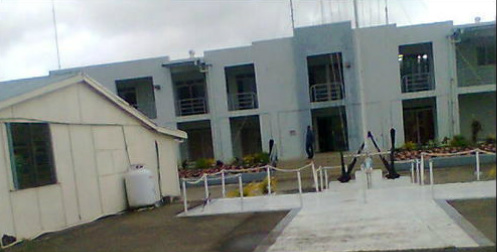
By VICTOR LAL
A Board of Inquiry was told to assemble at Stanley Brown Naval Base (left picture) on 24 August 2000 to inquire into the circumstances surrounding the alleged assault on state prisoners, that is to say, George Speight and others on board the KIRO whilst being transported to Nukulau Island on the morning of 22 July 2000.
The BOI was to comprise the President Lt Col S. Waqausa, and three other members, Lt Comdr WR Nakabea, Lt S. Tagicaki and Lt V R Gounder.
The Board was to summon witness, take evidence on oath and report their opinion and findings in-confidence to the Convening NL 1st day of September 2000 on the following matters:
The BOI assembled at the Fiji Navy headquarters and conducted its first hearing on Thursday 24th August and moved to its next venue at Nukulau Island on 30 August 2000. During the period it processed a total of 33 personnel that made up of 14 Naval personnel, 10 Military personnel and 9 members of George Speight's group.
Tagicaki departed for Hawaii on Sunday 27 August 2000, to attend a seminar under government grant. Gounder's inclusion was officially approved by Land Force Command on the same day as her substitute. See below the list of 44 questions.
|
Part A Questions
|
Part B Questions
|
